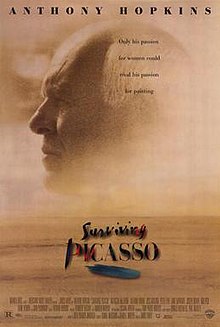Surviving Picasso
| Surviving Picasso | |
|---|---|
 Theatrical release poster | |
| Directed by | James Ivory |
| Screenplay by | Ruth Prawer Jhabvala |
| Based on | Picasso: Creator and Destroyer by Arianna Stassinopoulos Huffington |
| Produced by | |
| Starring | |
| Cinematography | Tony Pierce-Roberts |
| Edited by | Andrew Marcus |
| Music by | Richard Robbins |
Production companies | |
| Distributed by | Warner Bros. |
Release date |
|
Running time | 125 minutes |
| Country | United States |
| Language | English |
| Budget | $16 million |
| Box office | $2 million |
Surviving Picasso is a 1996 American biographical drama film directed by James Ivory and starring Anthony Hopkins as the famous painter Pablo Picasso. It was produced by Ismail Merchant and David L. Wolper. Ruth Prawer Jhabvala's screenplay was loosely based on the 1988 biography Picasso: Creator and Destroyer by Arianna Stassinopoulos Huffington.[1]
Plot
[edit]The young artist Françoise Gilot meets Picasso in Le Petit Benoit, a little Left Bank bistro, during Nazi-occupied Paris, where Picasso invites her and her friend to visit him at his home and studio at 7 Rue des Grands-Augustins. After doing so and flirting with Picasso she decides to become a painter against her father's wishes. Françoise is beaten by her father after telling him she wants to be a painter, rather than a lawyer. Picasso encourages her to paint and a love affair develops between them and she eventually moves in with him, even as Picasso is shown as often not caring about other people's feelings, firing his driver after a long period of service, and as a womanizer, saying that he can sleep with whomever he wants. We see other scenes of seduction, quarrels, and selfishness, but Picasso and Françoise have two children and move to the South of France near Cannes, but problems persist. In addition to Françoise, the film depicts several of the women who were important in Picasso's life, such as Olga Khokhlova, Dora Maar, Marie-Thérèse Walter, and Jacqueline Roque. The film ends when Françoise leaves Picasso over his coldness and his growing relationship with Jacqueline Roque, who moves in with Picasso and replaces her.[2]
Cast
[edit]- Anthony Hopkins as Pablo Picasso
- Natascha McElhone as Françoise Gilot
- Julianne Moore as Dora Maar
- Joss Ackland as Henri Matisse
- Dennis Boutsikaris as Kootz
- Peter Eyre as Sabartes
- Peter Gerety as Marcel
- Susannah Harker as Marie-Thérèse Walter
- Jane Lapotaire as Olga Khokhlova
- Joseph Maher as Daniel-Henry Kahnweiler
- Bob Peck as Françoise's Father
- Joan Plowright as Françoise's Grandmother
- Diane Venora as Jacqueline Roque
- Dominic West as Paulo Picasso
- Laura Aikman as Maya Widmaier-Picasso
Production
[edit]The Merchant-Ivory team was not able to obtain the rights to Gilot’s own autobiography, or the permission to show any of Picasso’s artwork. Commissioned fake Picasso paintings were made for the film that was shot in Paris and in the South of France.[3]
Reception
[edit]Critical response
[edit]On the review aggregator website Rotten Tomatoes, 32% of 19 critics' reviews are positive, with an average rating of 5.1/10.[4] Metacritic, which uses a weighted average, assigned the film a score of 55 out of 100, based on 18 critics, indicating "mixed or average" reviews.[5]
Box office
[edit]In the United States and Canada, Surviving Picasso grossed $2 million at the box office, against a budget of $16 million.[6]
References
[edit]- ^ [1] Roger Ebert on Surviving Picasso
- ^ [2] Roger Ebert on Surviving Picasso
- ^ [3] Roger Ebert on Surviving Picasso
- ^ "Surviving Picasso". Rotten Tomatoes. Fandango Media. Retrieved 2023-12-17.
- ^ "Surviving Picasso". Metacritic. Fandom, Inc. Retrieved 2023-12-17.
- ^ "Surviving Picasso". Box Office Mojo. IMDb. Retrieved 2023-12-17.
External links
[edit]- 1996 films
- 1996 drama films
- 1990s American films
- 1990s biographical drama films
- 1990s English-language films
- American biographical drama films
- Biographical films about painters
- Cultural depictions of Henri Matisse
- Cultural depictions of Pablo Picasso
- Films based on biographies
- Films directed by James Ivory
- Films produced by David L. Wolper
- Films set in Paris
- Films shot at Pinewood Studios
- Films shot in France
- Films shot in Paris
- Films with screenplays by Ruth Prawer Jhabvala
- Merchant Ivory Productions films
- The Wolper Organization films
- Warner Bros. films
- Films scored by Richard Robbins
- English-language biographical drama films
